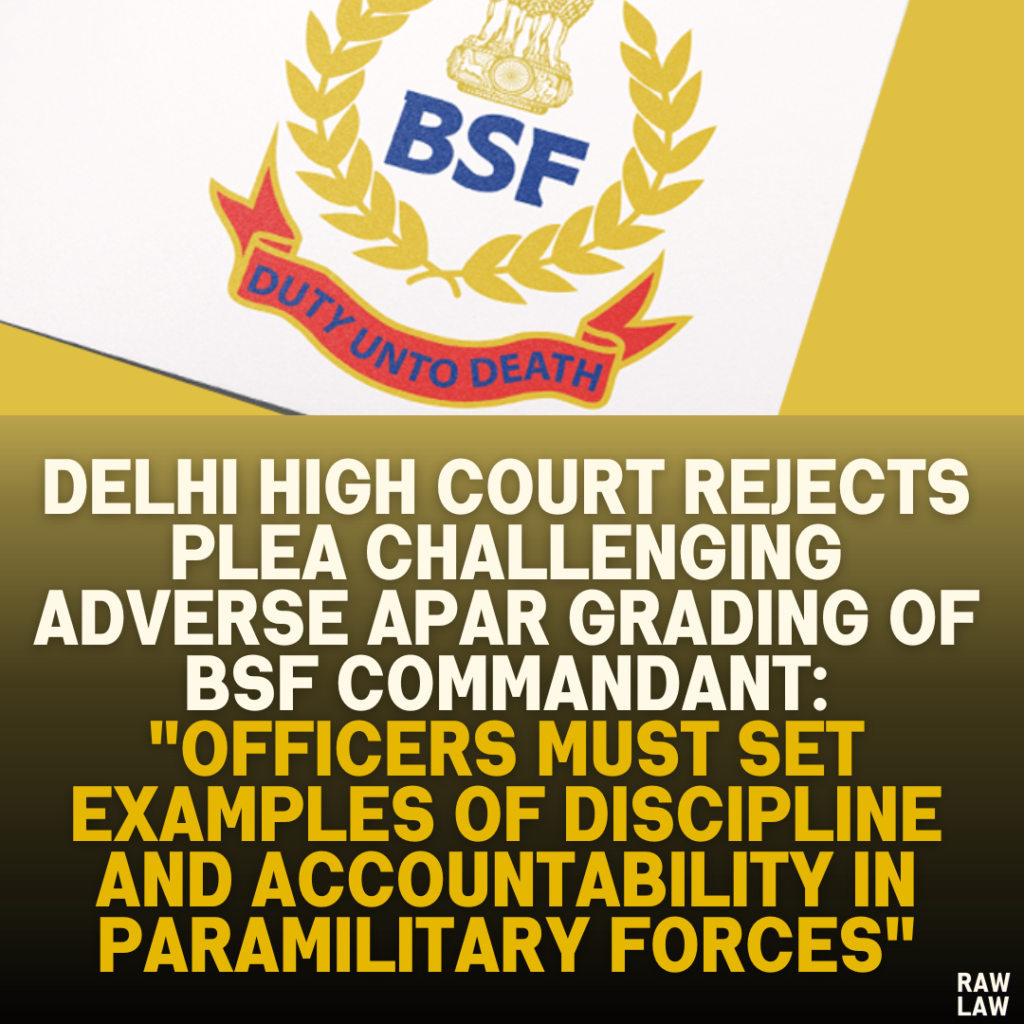Court’s Decision
The Delhi High Court dismissed a petition challenging the adverse remarks and below-benchmark grading in the petitioner’s Annual Performance Appraisal Report (APAR) for the year 2021-22. The court held that such gradings, being administrative in nature, should not be interfered with unless they are arbitrary, malicious, or violate established rules. It concluded that the petitioner’s grievances did not meet these criteria and upheld the adverse grading as valid.
Facts
The petitioner, a Commandant in the Border Security Force (BSF) with an unblemished service record spanning nearly 29 years, had consistently received “Outstanding” or “Very Good” ratings in previous APARs. However, for 2021-22, he was graded “Good” with adverse remarks. These remarks cited issues such as:
- Wearing civilian clothes during a ceremonial rehearsal despite instructions to wear a uniform.
- Delaying clearance of an important file before proceeding on leave.
- Taking multiple leaves during the year.
- Inadequate visits to border areas under his jurisdiction.
The petitioner argued that the grading was baseless, vengeful, and inconsistent with his previous record.
Issues
- Was the adverse grading arbitrary, actuated by malice, or violative of procedural rules?
- Did the petitioner’s actions during the year justify the adverse remarks and grading?
- Could past APAR ratings of “Outstanding” or “Very Good” preclude a lower grading for a subsequent year?
Petitioner’s Arguments
- Malice in Grading: The petitioner contended that the Reporting Officer had acted with malice, intending to damage his career. He argued that adverse grading undermines the purpose of the APAR, which is to ensure fair evaluation for career progression.
- Dress Code Miscommunication: The petitioner explained that he wore civilian clothes to a ceremonial rehearsal because of miscommunication. He claimed that the decision to change the dress code was not conveyed to him.
- File Clearance Delay: The petitioner attributed the delay in processing the file to his earned leave, arguing that 13 days (as opposed to the alleged 32) was a reasonable delay under the circumstances.
- Sanctioned Leaves: The petitioner noted that all leaves taken were duly sanctioned, and he argued that sanctioned leaves should not form the basis of adverse remarks.
- Border Visits and Night Halts: The petitioner argued that he was not obligated to make night halts or visits to the border as per the directives for his rank and responsibilities.
Respondent’s Arguments
- Discipline Breach: The respondents argued that the petitioner’s appearance in civilian clothes during a ceremonial rehearsal reflected indiscipline and poor judgment, especially as a senior officer.
- Casual Work Attitude: The delay in processing an important file, even for 13 days, was deemed unacceptable and indicative of a casual approach.
- Frequent Leaves: While the petitioner’s leaves were sanctioned, the frequency of leaves was interpreted as a lack of commitment to his duties.
- Failure in Operational Responsibilities: Despite clear instructions, the petitioner did not adequately visit or monitor border areas, which was essential for his role as Commandant (Ops).
- Justified Grading: The respondents maintained that the APAR grading reflected a fair assessment of the petitioner’s performance during the relevant year.
Analysis of the Law
The court reiterated its limited role in reviewing APARs, emphasizing that such reviews are confined to:
- Violations of Procedure or Rules: Instances where the APAR was prepared contrary to established guidelines.
- Malice or Bias: Situations where the grading is shown to be influenced by personal animosity or ulterior motives.
- Arbitrariness: Cases where the grading lacks any reasonable basis.
Referring to Manudev Dahiya v. Union of India, the court emphasized that APARs fall within the purview of administrative discretion. Judicial intervention is limited to ensuring procedural fairness and addressing instances of malice or arbitrariness.
Precedent Analysis
The court relied on Swapan Kumar Pal v. Achintya Kumar Nayak, where it was held that judicial review of administrative decisions should not extend to re-evaluating their merits. Instead, courts should examine whether decisions comply with established legal principles and procedures.
The court also noted that previous APAR gradings, even if favorable, cannot preclude lower ratings for subsequent years if the officer’s performance justifies it.
Court’s Reasoning
- Dress Code Violation: The petitioner’s explanation regarding the dress code change was unconvincing. As a senior officer, he was expected to maintain discipline and lead by example. Appearing in civilian clothes during a ceremonial rehearsal undermined the authority of his superior and set a poor precedent for subordinates.
- File Clearance Delay: While the petitioner attributed the delay to his leave, the court held that it was his responsibility to ensure timely clearance of critical files before proceeding on leave. The delay, even for 13 days, was deemed avoidable and reflected poor work ethics.
- Leave Frequency: The court acknowledged that the petitioner’s leaves were sanctioned but agreed with the respondents that frequent leaves indicated a lack of commitment to duties.
- Operational Responsibilities: The petitioner’s failure to conduct adequate border visits and night halts was interpreted as a lack of interest in his operational responsibilities.
The court concluded that the APAR assessment was based on valid observations and could not be dismissed as arbitrary or malicious.
Conclusion
The court dismissed the petition, affirming that the adverse grading and remarks were justified based on the petitioner’s conduct during the relevant period. It emphasized that APARs are annual evaluations that depend on an officer’s performance for a specific year and are not bound by previous ratings.
Implications
This judgment underscores the importance of maintaining discipline and professionalism, particularly for senior officers in paramilitary forces. It highlights the limited scope of judicial review in administrative matters, emphasizing that courts should not interfere unless there is clear evidence of procedural violations, malice, or arbitrariness.




Pingback: Delhi High Court Quashes Income Tax Notice Issued to Deceased Assessee; Holds Failure to Notify Legal Heirs as Jurisdictional Defect Under Section 148A(b) of the Income Tax Act - Raw Law